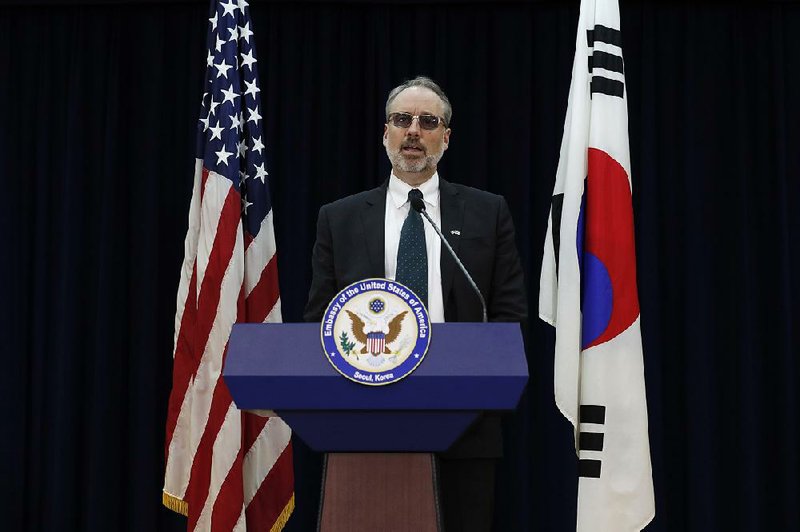SEOUL, South Korea -- North Korea said Tuesday it won't consider a recent U.S. decision to postpone a joint military exercise with South Korea a major concession that can bring it back to nuclear talks.
Senior North Korean official Kim Yong Chol said the U.S. must completely scrap that military drill and abandon its hostility against his country if it wants to see the resumption of the nuclear negotiations.
Kim's comments were the first direct response to an announcement Sunday by U.S. Defense Secretary Mark Esper and his South Korean counterpart that the allies have indefinitely postponed the annual Vigilant Ace training in an "act of goodwill" toward North Korea. The moves were regarded as an effort to convince North Korea to revive the nuclear talks that largely have stalled since the February collapse of a summit between President Donald Trump and North Korean leader Kim Jong Un.
"The U.S. tries to make a good impression as if it contributes to peace and stability on the Korean peninsula, describing the suspension [of the aerial drill] as 'consideration for and concession' to someone," Kim Yong Chol said in a statement carried by state media. "But we demand that the U.S. quit the drill or stop it once and for all."
North Korea wants the United States to lift international sanctions on it, provide security guarantees and make other concessions in return for abandoning its advancing nuclear arsenal. The February summit in Vietnam, the second such meeting between Trump and Kim Jong Un, fell apart after Trump rejected Kim's demand for sweeping sanctions relief in exchange of dismantling his main complex to produce nuclear ingredients, a limited disarmament step.
The two leaders held an impromptu, brief meeting at the Korean border in late June and agreed to restart diplomacy. In early October, their nuclear negotiators eventually resumed talks in Sweden, but the meeting failed to report progress.
North Korea said last week the U.S. recently proposed via an unidentified third country its offer to meet again in December. North Korea still said differences between the two countries won't be addressed with minor concessions like establishing a liaison office between the countries or formally declaring the end of the 1950-53 Korean War.
Kim Myong Gil, roving ambassador at the North's Foreign Ministry, disclosed Tuesday it was Sweden which conveyed the U.S. dialogue proposal. He said North Korea wants the U.S. not to go through a third country to offer talks and Sweden not to try to mediate in North Korea-U.S. diplomacy.
"It is not for lack of communication channel or mediator that [North Korea]-U.S. negotiations have not yet been held," Kim said. "The Swedish side would be well-advised to properly understand the situation and behave itself."
In his Tuesday statement, Kim Yong Chol also accused the U.S. of trying to buy time as a North Korea-set deadline for Washington to work out new proposals by year's end is approaching.
"The U.S. should not dream of the negotiations for denuclearization before dropping its hostile policy toward" North Korea, he said.
Meanwhile, U.S. and South Korean officials on Tuesday publicly acknowledged the allies remain far apart in negotiations for increasing South Korea's contributions to the costs for maintaining the American military presence on its soil.
U.S. negotiator James DeHart said the U.S. side decided to cut short a meeting that lasted less than two hours because Seoul's proposals "were not responsive to our request for fair and equitable burden sharing."
Seoul's Foreign Ministry said Washington has been calling for a "drastic increase" in South Korea's contributions which the country finds unacceptable.
"We look forward to resuming our negotiations when the Korean side is ready to work on the basis of partnership and the basis of mutual trust," DeHart said, reading out a prepared statement in front of cameras in Seoul. He did not take questions from reporters.
Jeong Eun Bo, a South Korean negotiator, told reporters that the countries have scheduled their next round of talks, but didn't specify when.
"It is true that there is a considerable difference between the proposals by the U.S. and the principles we are putting forward," Jeong said. "We will continue to make efforts with patience so that we reach a mutually acceptable agreement."
Information for this article was contributed by Kim Tong-Hyung of The Associated Press
A Section on 11/20/2019
